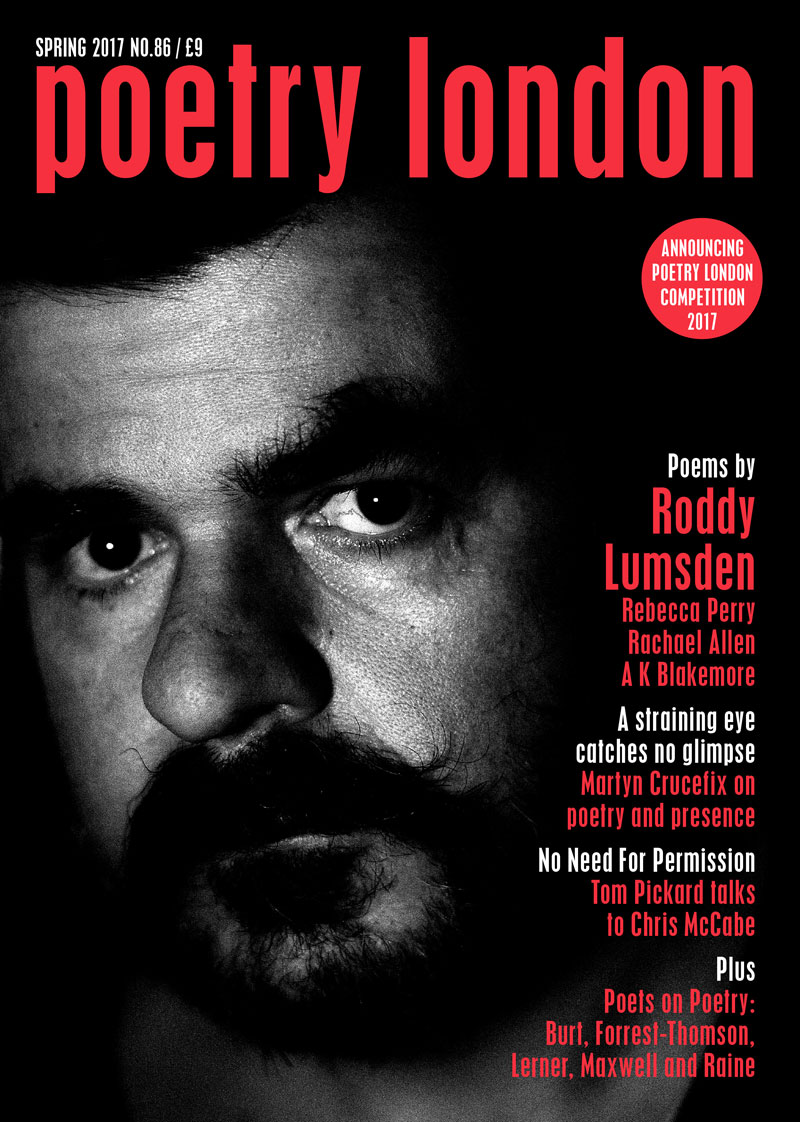Free running
A student at the Poetry School (whose day job is as a magazine journalist) recently remarked to me that her interest in poetry came from it being a form of extreme writing. The analogy, I supposed, was to extreme sports and the notion of poetry as a kind of verbal parkour. It seemed an analogy worth pursuing. Could one see the art as an activity exploiting all available energies, using no more equipment than it can carry, having an inherent danger and improvising its own rules? Tennis without the net, Mr Frost… and then some.
There is a sense in which poetry is, by its nature, a transgressive act. Whatever their content, the surface patterns and private logic poems use constitute an evasion, or side-stepping at least, of the customary rules of discourse. As Wittgenstein wrote, ‘even though a poem is framed in the language of information, it is not employed in the language-game of information’. Some of the prose pieces in this issue of Poetry London point to other ways in which the practice of poets can be disruptive to conventional thinking. Martyn Crucefix explores how poetry may stubbornly persist when other forms of language and meaning seem to have broken down. Claire Trévien celebrates how poets are exploring once taboo areas of experience with visceral gusto and, in his interview with Chris McCabe, Tom Pickard reveals how poetry for him has always worked ‘in parallel’ with political action.
If we accept this analogy, what then is the role of writing about poetry? Our newest Nobel Laureate once reminded us that ‘to live outside the law you must be honest’. Can the function of criticism then be to hold the disruptive art to account, to provide a space for plain speaking about language that already questions its own purpose? It’s a question that has been on my mind as I come to the end of my time as reviews editor.
The reviews and features in Poetry London provide contexts for the creative work in the magazine and for the wider world of poetry publishing. To that extent they make use of Wittgenstein’s ‘language-game of information’, telling us more about the background to new writing and suggesting ways in which it can be
read. The magazine’s attention to first collections and pamphlets, to poetry in translation and to poets who have gone out of fashion, can be seen as part of such a mission to inform.
Beyond that role, reviews and features can also constitute a form of persuasion. Some of the reviews in this issue focus on poets as critics and on the contrasting views they take on how poetry may be read and, by implication, should be written. At one extreme is Craig Raine’s preference for poetry that ‘makes sense’; at the other is the late Veronica Forrest-Thomson’s preference for poetry that resists ‘naturalisation’. It is perhaps a sign of a healthy reviewing culture that neither of these views escapes questioning. Elsewhere, Caleb Klaces notes Ben Lerner’s sense of a conflict between ‘actual poems’ and ‘the utopian ideal of Poetry’. In my time at Poetry London I’m happy to say that I’ve been more drawn to the sometimes chaotic variety of the former than to the mirage of any capitalized ideal.
Poetry London has from its beginnings championed the disruptive quality of the new and will continue to do so. It has been a pleasure to me to work with a team of editors committed to a broad and inclusive view of the contemporary scene that is welcoming to contributors from diverse backgrounds, and I have learned much from my colleagues during my time here. Sam Buchan-Watts is well placed to make a strong contribution to that team and I look forward to enjoying the magazine’s reviews under his editorship.


